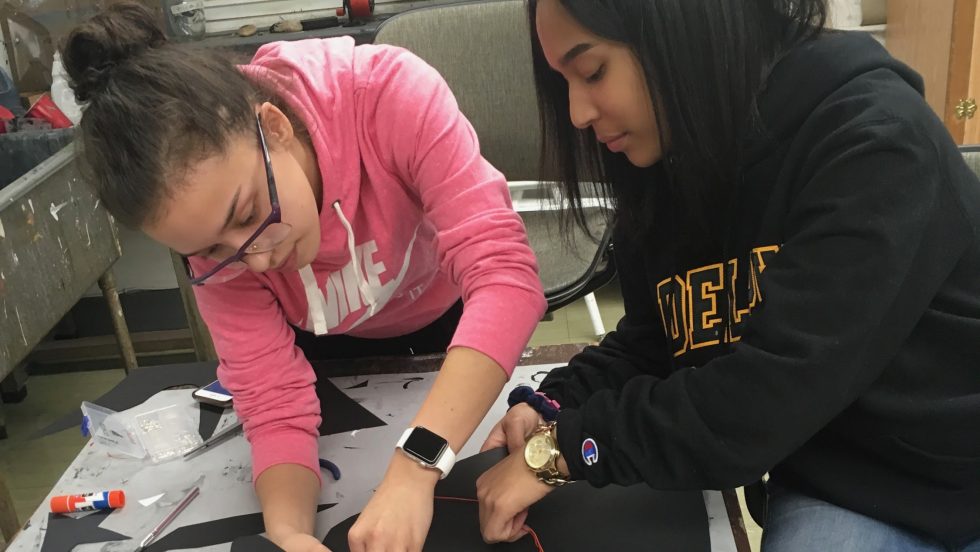
There’s a severe shortage of science, math and computer science teachers in underperforming schools. Adelphi’s award-winning STEAM Pipeline program is helping to change that.
While studying to become a science teacher at Adelphi, Seyi Okuneye, MA ’13, visited a farm with a class and was encouraged to write haikus inspired by nature. As future teachers, Okuneye and his classmates were discovering new ways to help students connect to the environment.
Okuneye, who came to the United States from Nigeria, wanted to understand how the American school system worked, but he gained an even broader perspective on how art and science work together. “I wanted to learn different pedagogical skills and strategies,” he says. “Adelphi’s program allowed me to explore and open up my mind to this new perspective.”
Okuneye received his master’s degree several years ago after participating in Adelphi’s Science Education Advancement (SEA) program, which was funded by The Robert Noyce Foundation/National Science Foundation. A Phase II of the funding was approved last May, establishing the New York Noyce STEAM Pipeline. It will formally mix art and science to teach the next generation of science educators.
Launching in May 2020 at Adelphi’s Manhattan Center in New York City, the STEAM Pipeline program aims to serve the national need of preparing high-quality science teachers to teach in high-need school districts for a minimum of two years after graduation. The program will recruit, support and prepare 28 science teachers over the next four years. In this one-year accelerated graduate program, students will be taught to mix STEM (science, technology, engineering and mathematics) with art and design in the teaching process.
Though still in the recruitment process, the STEAM Pipeline has already received the Inspiring Programs in STEM Award from INSIGHT Into Diversity magazine, the oldest and largest magazine devoted to diversity in higher education. This award reflects Adelphi’s commitment to forging connections within the community.
“Emerging research findings in STEAM suggest that art is a powerful onboarding mechanism for students who don’t initially see themselves as scientists,” said associate professor of education Tracy Hogan, PhD, who is principal investigator of the project along with her co-investigator, Cindy Maguire, PhD, the academic director of Adelphi’s art and design education program. “We can engage students with different technologies like e-textiles and software design platforms. They start playing around with them and think, ‘Oh, I could really see myself working in a field like circuitry or computer programming.'”
Professor of biology and department chair Andrea Ward, PhD; associate professor of biology and graduate coordinator of the Environmental Studies program Aaren Freeman, PhD; and Matthew Curinga, EdD, associate professor of education, round out the program team.
STEAM Pipeline students will take new Adelphi courses in STEAM and interactive technologies. Students will gain teaching experience through a STEAM focus at schools in the Mineola Union Free School District on Long Island as well as in middle schools and high schools in New York City.
Graduates will also benefit from a two-year support program. They’ll return to Adelphi for monthly meetups to discuss the challenges of their new careers and exchange insights for integrating STEAM into their curricula under the guidance of Adelphi faculty members in teacher education.
STEAM Pipeline is the successor to Science Education Advancement (SEA), Adelphi’s previous scholarship program for students interested in becoming science teachers. Funded by the National Science Foundation, SEA was largely focused on ecology, offering field experiences with marine educators on Long Island.
After graduating from that program in 2013, Okuneye became an earth and marine science teacher at the Metropolitan Expeditionary Learning School in New York. He’s also been a research associate and STEM educator at NASA, studying climate models of West African monsoons.
“In the seven years since I left Adelphi, I’ve been able to leverage all those experiences [in the program],” Okuneye said. “Especially as someone who just came in from a very different country, I don’t think I would have accomplished all these things without having that platform.”